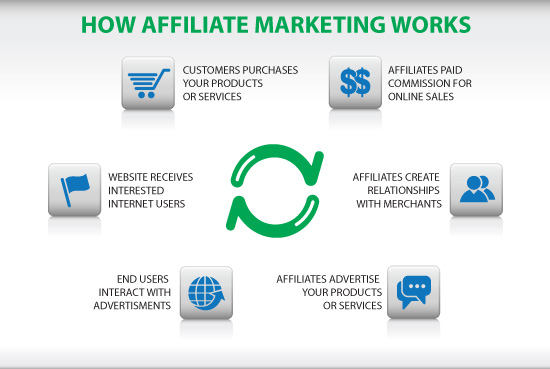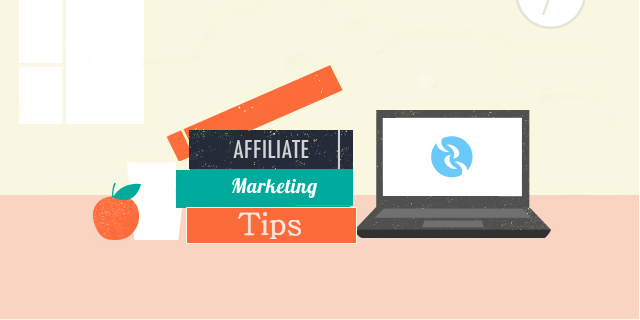Before I start, I would like to make one thing clear:
This article mainly covers the following topics:
- What affiliate marketing is and the different types of affiliate marketing
- The advantages of being an affiliate marketer
- Some tips and good practices to become a successful affiliate marketer
So, can you really make money from affiliate programs? Well yes and no; there is money in affiliate marketing but if YOU can make money from it or not depends on a lot of other factors such as your commitment, experience, site traffic etc.
What is Affiliate Marketing?
According to Wikipedia
Basically, you as a publisher will be rewarded when you help a business by promoting their products or services. So for example, if you sign up for Tips and Ticks HQ’s affiliate program and promote it’s products then you will get a commission when the visitor you send from your site makes a purchase.
Affiliate marketing is probably one of the quickest and cheapest (not the easiest) ways to start making money online as you don’t have to create any products yourself. You simply link up a buyer and a seller, and you take a commission on the sale that has been referred by you.
How Does Affiliate Marketing Work?
When you join an Affiliate program and choose the products that you want to sell, sellers provide you with a unique affiliate code that you can use to refer traffic to the target site. Most affiliate programs will offer ready made text links, banners and other forms of creative copies whereby you only have to copy the code and place it on your website to start referring traffic. When interested visitors click on these links from your site they get redirected to the product site and if they purchase a product or subscribe to a service you as the referrer make a commission.
The sellers can track your performance through your affiliate ID and the affiliate softwares (eg. WP Affiliate Platform) that they use. You also have complete, real time access to all sales and commissions stats.
You don’t need to sell products all the time to make a commission. Different affiliate programs can use different payment terms such as:
- Pay per Sale: In this program a merchant pays you a percentage of the sale price when the purchase is completed.
- Pay per Click: In this program you get paid based on the number of visitors you redirect to the Merchant’s website from your affiliate site, whether or not a sale is made.
- Pay per Lead: You get paid once the referred visitors provide their contact information on the target site by filling out a simple contact form.
Why be an Affiliate Marketer?
Affiliate marketing is considered to be one of the world’s fastest growing and best internet marketing techniques to earn money online and I will explain why:
- Cost effective: Marketing on the internet is cheap and you don’t have to worry about the production cost as the product is already developed by the seller. You don’t need a physical business location or hire employees either.
- Global Market: Online marketing gives you the opportunity to reach people all over the world easily.
- No Fees: You don’t need to pay anything to join affiliate programs.
- No Storage No Shipping: You don’t need to worry about storage, packing or shipment of the product. They are all taken care of by the seller.
- No customer support: You don’t need to provide any customer support or deal with consumer complaints as the Seller does that for you.
- Passive income: A regular job can give you a fixed income as long as you continue to work. Depending on your marketing skill Affiliate marketing can create a steady flow of income even when you are not in front of your computer.
- Work from home: If you make enough money then you don’t have to worry about going to work at the same time every day or getting stuck in traffic. You can work in the comfort of your own home.
Tips on Becoming a Successful Affiliate Marketer
After reading all the benefits of affiliate marketing if you think you will be rich over night by selling affiliate products online then you are wrong. Affiliate marketing is definitely an excellent way to make money online but it’s highly competitive too. In order to be successful in Affiliate marketing you need to know the market needs, learn how to promote products, what works and what doesn’t. The following are a few tricks on becoming successful in affiliate marketing that I have learnt over time.
1. Only Choose a Handful of Good Products
The first mistake a lot of affiliate marketers make is that they register with too many different affiliate programs and try to promote everything. Pursuing affiliate marketing down this path can become very overwhelming and you won’t be able to promote any product properly. All you need in order to be successful is a handful of good products to promote. Try to understand the market needs and look for products that align correctly with the topic of your site.
2. Use Several Traffic Sources to Promote Products
Most affiliate marketers put up the ads only on their sites. There is nothing wrong with this approach but know that there are many other traffic sources that you can tap into and promote the products simultaneously. The more targeted traffic you can send to the sales page the more your chances are of making money.
Google Adwords can be used to drive targeted traffic to a sales page. You simply make an ad in your adwords account then use your affiliate link in the target page URL of the ad. Obviously, you will have to continuously measure the conversions and see if the campaign cost is less than the campaign profit in order to keep the campaign running but I am sure you get the idea.
3. Test, Measure and Track Your Affiliate Campaign
It is a very good idea to use different product promotion strategies so you can figure out what is working and what is not. Try to do split testing and measure the performance of each campaign then take actions accordingly. Changing a few things here and there can increase your profit dramatically. Make sure to place the banner ads on different areas of your site’s pages. Some positions will make the ads more noticeable than others.
Most affiliate programs will give you basic stats that you may need but there is nothing stopping you from using your own conversion tracking software too. There are many conversions tracking sofware out there that you can use to track your affiliate campaign.
4. Research the Demand of the Product
If you try to sell a product that is in low demand then chances are that you are not going to get many sales no matter how hard you try. So it is a good idea to spend a bit of time researching and finding out if a product that you are thinking of promoting is a product that your audience needs. If your site gets decent traffic then you can conduct an online survey and easily get input from your visitors.
5. Stay Current with New Methods and Techniques
Affiliate marketing is a very competitive field and people are always coming up with new techniques. Try to stay current with these new techniques and market trends otherwise you will fall behind.
6. Choose the Right Merchant
When you promote a product you also promote the person or the company who is behind the product so try to choose wisely. You don’t want your visitors to go and buy a product following your advice then come back unhappy. Do you think that this visitor will come back to your site and take your advice again? Most likely no; this can hurt your credibility in the long run. Usually, websites/company that offer good customer service will have better customer satisfaction so try to stick with promoting their products.
7. Use Helpful Tools
If you are serious about affiliate marketing then try to find tools that will help you be more efficient. There are many helpful tools out there. If you are using a WordPress powered site then consider getting a plugin similar to the Affiliate Link Manager.
Don’t just hope and pray that visitors will buy; setup everything correctly and make it happen! If you think that visitors will click on your affiliate links and buy just because you placed dozens of affiliate links on your website then you are wrong! You need to have a structured plan in place. Affiliate marketing is a business so you will have a much better chance of succeeding if you treat it like one.
Source: www.tipsandtricks-hq.com/can-you-make-money-from-affiliate-marketing-if-so-how-2473











